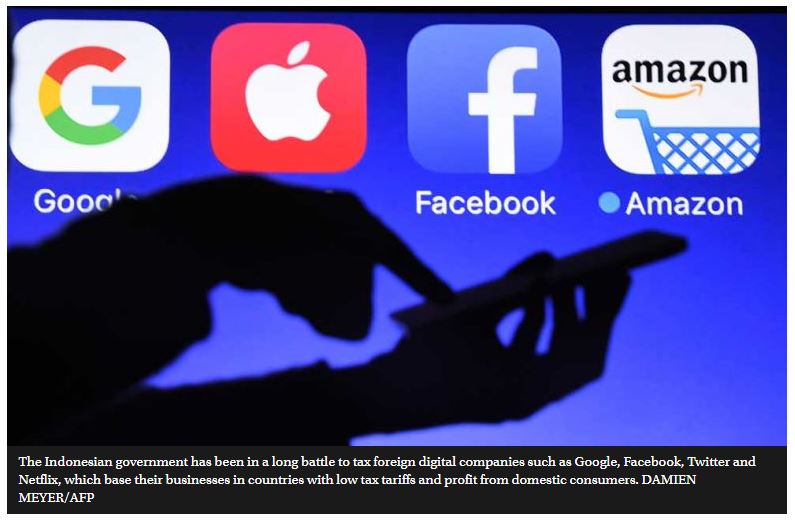Indonesia: Tech giants to face tighter tax scrutiny
Indonesia will follow in the footsteps of several major economies by taxing digital companies, with a newly proposed taxation bill set to serve as legal footing for the government to collect corporate income tax from foreign tech giants doing businesses in the domestic market.
The government has been in a long battle to tax foreign digital companies such as Google, Facebook, Twitter and Netflix, which base their businesses in countries with low tax tariffs and profit from domestic consumers. Such a practice leads to unfair tax treatments, particularly for domestic businesses.
Finance Ministry Taxation director-general Robert Pakpahan said the government was looking to revise the definition of tax subjects in the new bill in a bid to better tax such companies.
“We’re now trying to define the BUT [permanent establishment] beyond a physical presence to cover significant economic presence while waiting for a G20 [Group of 20] solution,” he said.
In their latest meeting in Fukuoka, Japan, in June, finance ministers and central bankers from G20 countries issued a communique endorsing and approach taken by the Inclusive Framework on Base Erosion Profit Shifting (BEPS), marking another step closer to a unified and consistent global tax treatment for digital companies.
The significant economic presence concept is one of the two pillars endorsed by the framework, a working group under the Organisation for Economic Cooperation and Development, which brings together more than 125 countries and jurisdictions to fight against global tax avoidance.
The concept enables a country to tax companies that create value from their business models despite a minimal physical presence, or indeed none at all, in its market jurisdictions.
“The proposed regulation will be applied to all companies, except if there’s a tax treaty in place,” Robert said. “If we have signed a tax treaty [with the country where the company is based], we will refer to it.”
According to a tax office document, foreign tech firms will be subject to the existing corporate income tax tariff of 25 per cent once they are categorised as permanent establishments.
In the meantime, countries around the world are still waiting for a long-term solution to taxing digital companies, among other institutions, which is set to be announced next year by the Inclusive Framework on BEPS.
In a recent blog post after the G20 communique was announced, Google vice-president of government affairs and public policy Karan Bhatia said the tech giant hoped governments could come to a consensus on a framework that ensured fair taxation and promoted clear rules for similar companies operating around the world.
He also urged governments to work together so that “more taxes can be paid where products and services are consumed, in a coordinated and mutually acceptable way”.
VAT for Google adverts
Google has announced that it will start collecting value-added tax (VAT) for Google Advertising services in Indonesia starting October 1. Its invoice and bill for domestic companies will be issued by Google Indonesia in rupiah and be subject to 10 per cent VAT.
The move is a step ahead of the government, which in the proposed tax bill will set a legal basis for it to name foreign entities as a tax subject that is obliged to collect VAT for goods or services consumed in Indonesia.
This means that Indonesia will soon follow steps already taken by neighbours Malaysia and Singapore in taxing the digital economy by next year.
Robert explained that the policy would ensure that the tax authority could capture tax revenue over domestic consumption of goods and services sold by entities that had no presence in the country.
“These days, it is possible that providers [of goods and services] are established outside the country, but the consumption [of goods and services] happens domestically,” Robert said.
He added that the provision specifically targeted the consumption of intangible goods, such as music streaming or e-book downloads, among other services. He cited data from Google and a Temasek study, which revealed that consumption of intangible goods and services in the country amounted to 93 trillion rupiah ($6.59 billion) last year and was set to grow to 270 trillion rupiah by 2025.
Indonesian e-Commerce Association (idEA) chairman Ignatius Untung welcomed the policy, adding that such a move would provide a level playing field for domestic and foreign players in the digital economy.
“It is a positive move because it will provide fairer competition,” Ignatius said.
THE JAKARTA POST


 English
English




